How to Teach Yes No Questions in Speech Therapy
Yes no questions are a common target for speech therapy sessions because once a child can answer yes no questions, you will be able to get more information to find out what they are trying to communicate to you. This can be incredibly helpful to reduce frustration caused when a child is trying to tell you something but can’t be understood.
Here are some activities that can help you teach a child how to answer yes no questions. Make sure that the child is very good at each step before you move on to the next one. This make take some time to teach and practice but it will completely be worth your time!
Yes No Questions Speech Therapy Step 1:
Do You Want it? (Yes)
To do speech therapy for yes no questions, we start with something that is very motivating to them. Show the child something you know he likes, such as bubbles or a favorite snack. Then, ask the child, “Do you want ____?” (Fill in the blank).
If the child shows you that he wants it (by reaching for it or repeating the word), model “yes” for the child to imitate. You can do this by having him say the word yes or by nodding his head up and down. As the child gets better at this, try just nodding your head to remind him instead of saying the word “yes” for him to imitate each time.
If the child is not yet communicating with words or a head nod, you can also use pictures of “yes” and “no” (such as a green check and red X) and have the child touch or hand you the correct picture instead.
Yes No Questions Speech Therapy Step 2:
Do You Want it? (No)
Start with the above activity. When the child is consistently answering yes, try offering something that you know she would answer “no” to. For example, if you’re playing with bubbles and the child is consistently answering “yes”, now switch it up and offer something uninteresting, like a small scrap of paper: “Do you want paper?” Model “no” just like as described above with yes. Say “No, no paper” and switch back to the one you know she likes: “Do you want bubbles?”
The next step: Once you’ve practiced helping her say “no”, try to get her to answer without your help. If she still says “yes”, say “yes, yes paper” and hand her the uninteresting object. She will probably be confused because that wasn’t really what she wanted. When she discards it or hands it back to you, say “oh! No, no paper” and switch back to offering the preferred object.
For some children, you may have to go a step farther by making the “no” object something they really don’t enjoy. Don’t offer something that will cause the child to have a meltdown, but if there is a food the child doesn’t like or a toy/object that he doesn’t like, you can use this for your “no” item. This will create a stronger reaction in the child which may generate the push you need to get him/her to say “no”.
Yes No Questions Speech Therapy Step 3:
Basic Wants and Needs
Before moving on to this step, make sure your child can answer “Do you want ___” with either yes or no depending on if she actually wants it (make sure she’s not just saying yes to everything). Once your child can do that, try using other questions about her basic wants and needs.
Basic Yes No Question Examples:
- Can I have…
- Do you need help?
- Are you ready?
- Do we go this way? (when trying to get to where the child wants to go)
- Are you hungry?
- Are you thirsty?
- Do you need to go to the bathroom?
- Are you wet?
- Are you dirty?
- Are you done?
- Do you want more?
Yes No Questions Speech Therapy Step 4:
Identification Questions
Once the child can answer yes no questions about his/her basic wants and needs, try asking questions about what things are called. For this activity, show the child an object or a picture and say “Is this a ___?” Use the correct name for the item sometimes and say the wrong word other times. Help the child answer either “yes” or “no”.
If the child is struggling to identify what things are called, you may need to go back and work on vocabulary first. Click here to view our resources on teaching vocabulary words.
Yes No Questions Speech Therapy Step 5:
Mixed and More Complex Questions
Now that the child is answering these basic yes/no questions, you can start asking other yes/no questions throughout the day. You can also start asking more complex questions. Help the child remember to answer with yes/no when you ask. Keep data on what types of yes/no questions the child is still struggling with so you can continue to provide practice for unfamiliar questions.
For more ideas of yes/no questions to ask in speech therapy, download our question pack here.
How to Help a Child with Autism Respond to Yes No Questions
Children with autism sometimes have additional difficulty with answering questions. They may not understand that the question requires a response at all. Or, they may not know how to answer once the question is asked. For more ideas on helping children with autism respond to questions, click here.
Additional Resources for Yes No Questions Speech Therapy
Check out our additional resources for working with children who are struggling to answer yes no questions.

About the Author: Carrie Clark, MA CCC-SLP
Hi, I’m Carrie! I’m a speech-language pathologist from Columbia, Missouri, USA. I’ve worked with children and teenagers of all ages in schools, preschools, and even my own private practice. I love digging through the research on speech and language topics and breaking it down into step-by-step plans for my followers.
Fun Fact: When I worked in a special education preschool, I was amazed at how much I learned from the other professionals on my team. I learned more from the special educators, OTs, PTs, behavior specialists, etc. than I ever could have in grad school. It’s never a wasted effort to build relationships with the people around you!
Connect with Me:

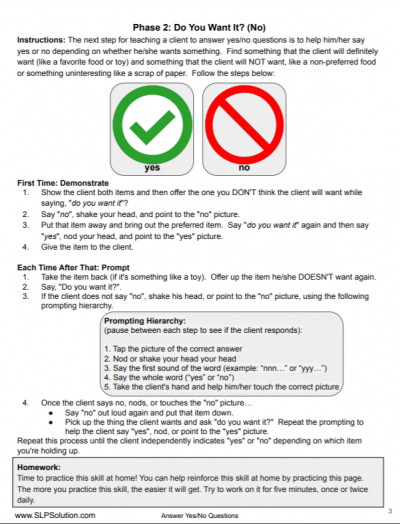
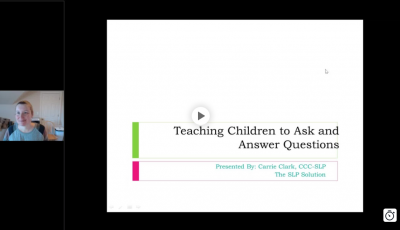
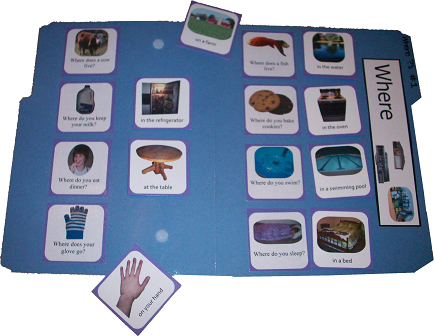
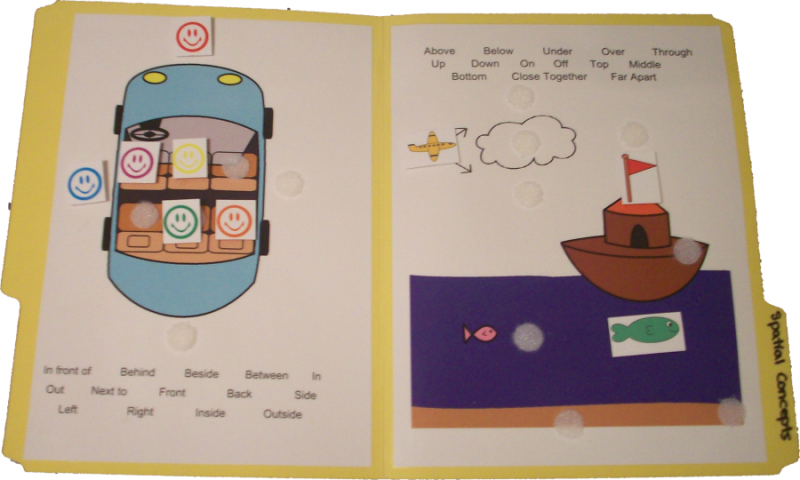
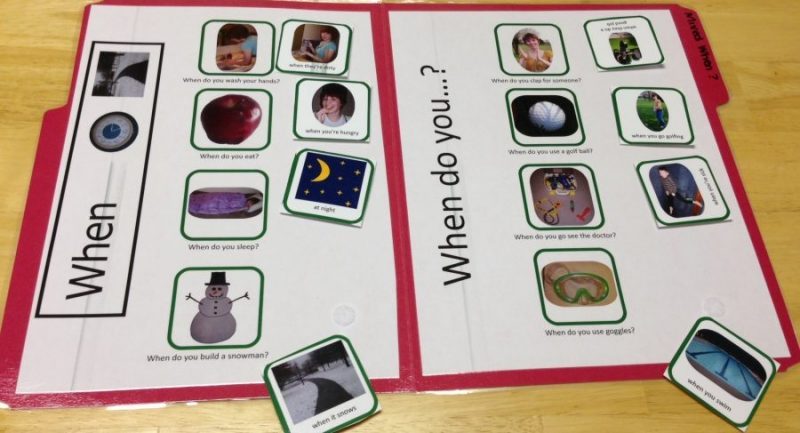






Hi, im so happy i came across your website, my daughter is in nursery and shes had speach problems in the past ,coysins her age were better talkers than her, however she had more understanding and memory but just couldnt explain it, she would mumble and they say some words clearly and back to mumbling. With reading lots of books to her and singing songs and rhymes especially by using props her language and vocab has grew in leaps and bounds. However, she uses yes for yes or no questions, which is why im sending this comment i will be using your technique and hopefully it works!!
Anisa
I hope it does! It sounds like you’ve been doing a lot of really great things with her already!!
Hello what to do if 23 month old answers all questions with no?
It could just be that the child is being defiant (very normal) or that he really doesn’t understand. If you’re worried, speak with your child’s doctor!
Hello greatful for this write-up.my son who is 3yrs and 6months old has problem with yes or no questions. He was slightly tongue tied until a year ago when it was cut ever since his speech got clearer and his vocabulary increased alot and his quite a talker.he can recite his letters n numbers,write and identify but when questions are asked like “is it good to eat in the morning, yes or no?” He answers back yes or no.we tried different methods with him his great at saying no need to remind him at times to use the word yes but uses it without prompting too.younger kids already answer yes or no question I’m worried but will start this technique with him.thanks for write up again
You’re so welcome! I hope this helps!!
Hello, your suggestions have been very helpful. My son is unable to answer yes/no for abstract questions …like did you go to school today? He says yes even if he did not go that day….however he answers the basic yes or no questions right.
Please advice.
That can be so tricky! All I can do here is to provide general advice (like this blog post) since I haven’t worked with your son directly. But a speech-language pathologist in your area will be able to troubleshoot and get into some deeper strategies if needed!
Hi – I found your article very helpful but wondered what your take is on a 3 year old who when asked “Do you want a drink” answers “I do”,”Can I help you” answers “You can”, and “Shall we have lunch?’ answers “we shall”. Is this just something to be noticed now and something that he will grow out of, or something more? Thanks
what will I do to a seven year old boy that could not communicate very well, and have difficult in understanding some things.
Hi – Great write-up. My son does not answer “yes” or “no” but rather repeats my question. When he has a request, he asks me in the form of a question. For example, if he wants a drink, he would pull me by the hand and ask, do you want a drink? He is 3 yrs old.
Thanks
Hello, Shaun- Thank you so much for reaching out. Unfortunately, we get a ton of questions every day about how to solve specific speech/language problems. Since we have such a small staff, we aren’t able to answer every question that comes through on the website, social media, or via email. If you are a parent, we suggest you reach out to a local speech-language pathologist who can work with your child directly and answer your question.
If you are another speech-language professional, we have created a membership where we pay a full staff to answer questions like this on a regular basis. We would be more than happy to answer your question inside the membership program. We’re able to answer more questions in here because we have a full library of questions that we’ve already answered so our staff can either link you to the answer if it exists, or write you a custom response if needed. We’d love to see you inside the membership!
Click Here to Become a Member: https://www.slpsolution.com/pediatric-signup/.
I have a question about answering yes/no questions based on labeling items (is this a ___). My client will consistently answer ‘yes and no’ for all questions. However, when I give him choices between preferred and nonpreferred items, he will answer correctly so he understands the meaning of yes/no. Do you have any recommendations to try? Thanks in advance!!
Hello! Thank you so much for reaching out. Unfortunately, we get a ton of questions every day about how to solve specific speech/language problems. Since we have such a small staff, we aren’t able to answer every question that comes through on the website, social media, or via email. If you are a parent, we suggest you reach out to a local speech-language pathologist who can work with your child directly and answer your question.
If you are another speech-language professional, we have created a membership where we pay a full staff to answer questions like this on a regular basis. We would be more than happy to answer your question inside the membership program. We’re able to answer more questions in here because we have a full library of questions that we’ve already answered so our staff can either link you to the answer if it exists, or write you a custom response if needed. We’d love to see you inside the membership!
Click Here to Become a Member: https://www.slpsolution.com/pediatric-signup/
Thanks for this info! I also thinks visuals and gestures are super helpful for working on yes/no questions! These types of questions can be so abstract that having extra support can be helpful!
Do you have any research you could share that supports this method of teaching yes/no questions? Or is it strictly clinical experience that had molded your procedure for teaching this skill?
Hey there! Thanks for reaching out! This method is part based on my clinical experience and part based on two evidence-based practices: scaffolding and task analysis. Scaffolding is when we provide supports and modifications to make a skill easier to obtain by a child. Then, we gradually reduce those supports and modifications so that the child is able to complete the skill with increasing independence. Task Analysis is when we break a larger task into a step-by-step plan to make it more manageable to achieve. By combining these approaches with our knowledge of how children tend to develop yes/no questions naturally, we can break down the skill to its easiest form and then build their independence step by step.